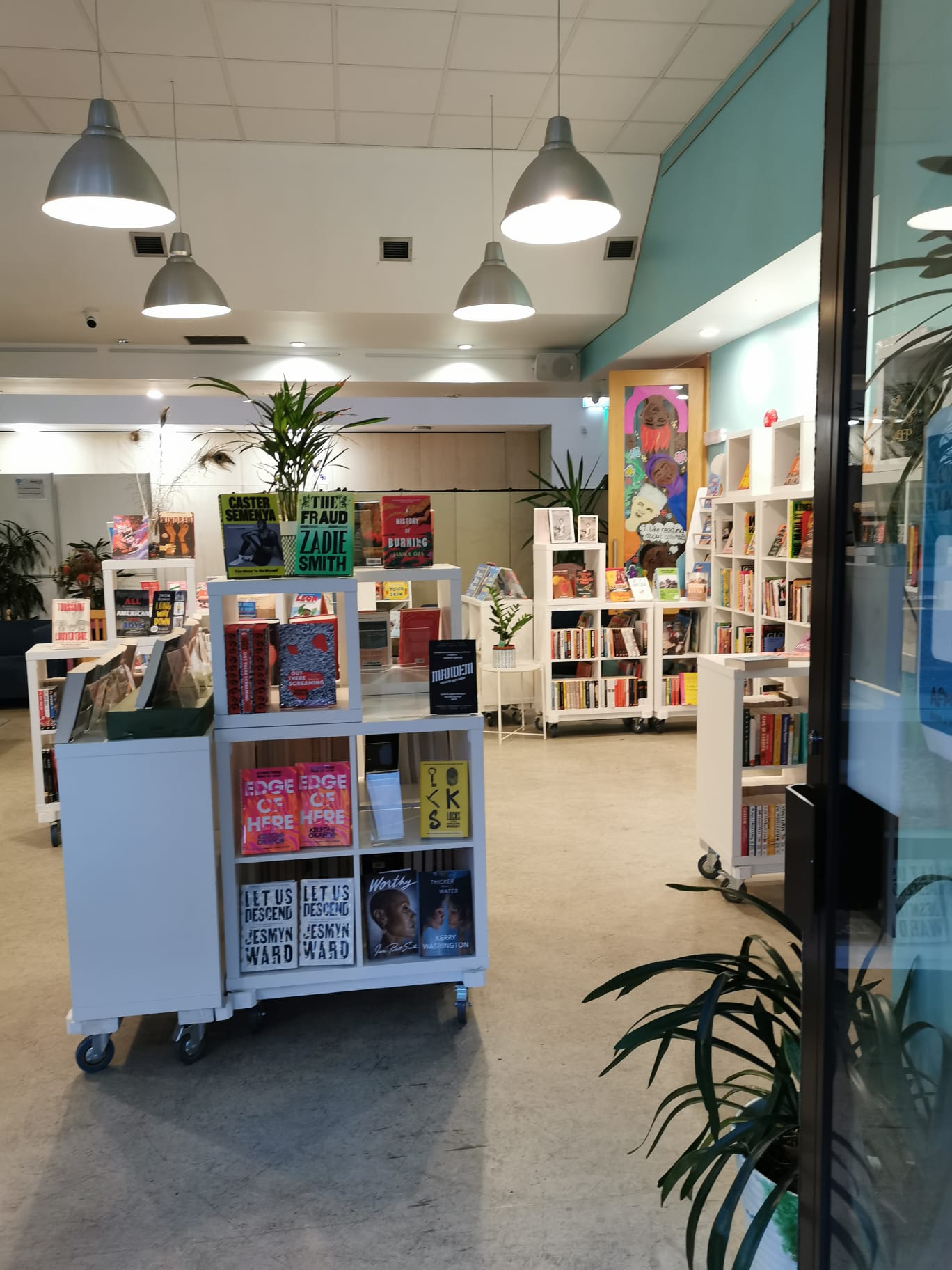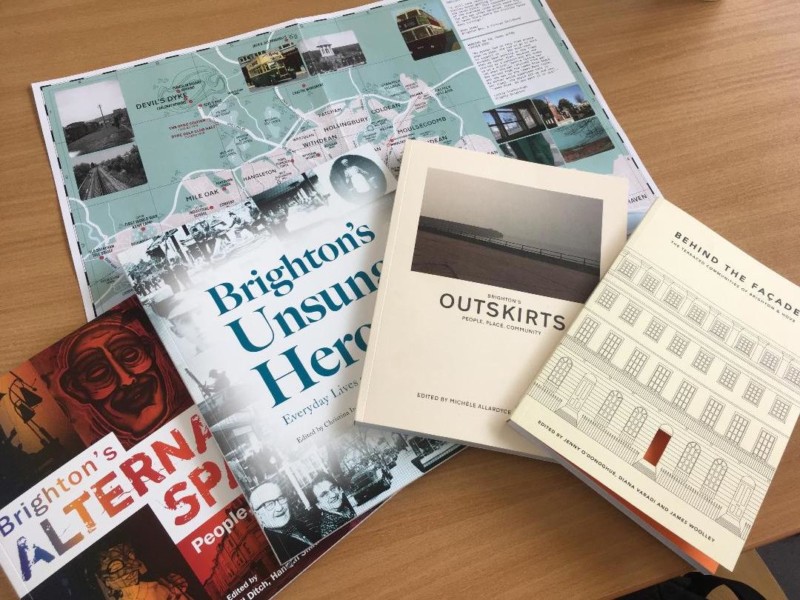Protestors against a proposal to convert the 1824 Royal Spa building in Brighton’s Queen’s Park into a casino in 1972, deployed oral histories in their campaign, and helped establish QueenSpark Books. More than 50 years later, QueenSpark Books continues to collect and publish the untold life stories of Brighton & Hove residents. Through oral histories and creative responses to local history, via books, e-books, exhibitions, events, websites and other projects, Queenpark inspires and involves the residents of the city – particularly people who are seldom heard.
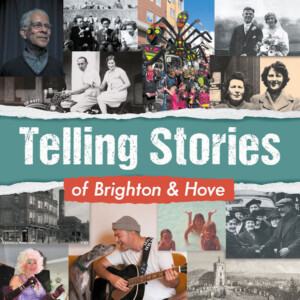
The cover of Telling Stories, QueenSpark’s 50th Anniversay book
A similar response to injustice and exclusion fired Afrori Books’ founder, Carolynn Bain. Tired of bookstores with a tiny ‘BAME’ section for black authors, Afrori created a bookstore in 2021 here in Brighton which offers customers one of the biggest selection of books by black authors in the country. It is hard to become an author, figured Carolynn, and harder still to be a black author. Surely, they and we deserve better?
QueenSpark Books’s John Riches and Afrori’s Carolynn Bain discuss with Melita Dennett what it means to be a non-mainstream book retailer, and in QueenSpark’s case, a publisher too.
Melita Dennett: Let’s start off looking at books, because people have long predicted the death of the book. And despite that, people still love books as artefacts.
John Riches: That’s an interesting start. It makes me recall that when I started at QueenSpark Books twenty years ago, the Arts Council, which was funding my role at the time, emphasised the importance of e-books. Kindle was just emerging, and the consensus was that printed books might not survive another decade. Obviously, wrong!
Carolynn Bain: It was a lack of understanding on the part of those who predicted the death of books. People have always had multiple ways to consume information. But let’s remember, too, that the rise of the audiobook and electronic book is a welcome advance for those who have struggled with reading and a bonus for those who wanted a bit more flexibility around reading.
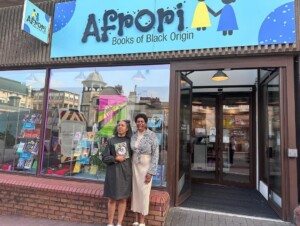
Outside Afrori Bookshop © Afrori Books
JR: That’s true, of course, but I think one reason printed books have persisted is that many people appreciate books as physical artefacts. They like to hold them, see the cover, and if they’re involved in the creation, they value them even more. We always aim for good design and production so that people can be proud of owning our books. I remember observing people in bookstores; they would often gravitate towards local sections. It’s fascinating to watch how people engage with physical books, something you can’t replicate with a Kindle search. Despite promoting both formats equally on our website, we still sell more print books than e- books. This suggests that printed books retain their appeal as tangible objects.
CB: Yes! For as long as people have imaginations and a desire for knowledge then books will continue to have a place in society. And bookshops, too, although I know all too well how much time, energy and passion they require!
JR: My sense is that even though print and e-book sales have declined due to the pressure on people’s finances, there’s still significant value in the physical book and the experience of browsing in a bricks-and- mortar shop with curated collections that provide a browsing experience you can’t get online. Afrori is a wonderful place, and proves my point, I think. And just recently, QueensPark held an event at Kemp Town Books, which highlighted value of the physical space. While online searches are driven by algorithms, standing in a bookshop allows you to explore a wider range of subjects spontaneously. The event, attended by 30 people, underscored how much people value the physical bookshop experience. Local bookshops excel at offering unique and diverse selections, something that remains vital in the digital age.
MD: How do you reach new audiences? Is social media absolutely crucial? How about in-person events?
CB: Social media is key to who we are as a book shop and as a community space. Both of our crowdfunds came through social media. And day-to-day people engage with our social media presence. Our pledge is to use our platform to support black authors, so it is imperative that we have a digital platform. We have spent a lot of time building a strong following, and we use social media to support our followers and to speak out. We have had a few posts taken down by those in charge, but we keep pushing. All of that is great, but converting this to sales is not smooth. People coming to events is definitely the biggest sales space for us. And using social media to get them to the event has been a big win for us.
JR: We’ve been revamping our social media and online sales platforms, and are just starting to try a few new strategies. We’ve seen a slight increase in website traffic and a few more likes on social media, but haven’t seen a significant impact on sales yet. Interestingly, at the recent event at Kemp Town Books I mentioned earlier I only recognised two or three out of the 30 attendees. This suggests that having a presence, whether through social media or events, makes a difference. We’ve noticed that when we have stalls at events people are more likely to buy our books after seeing them in person. So while it’s important to maintain an online presence, I really believe that physical presence at events is more effective in driving sales.
MD: And how about the level of interest from younger audiences?
CB: Afrori Books sits in a wonderful place where our customers are mostly younger than the average bookshop customer. And I don’t mean the Tiktok customers. LoL!. Our events and the bookshop attract young activists and professionals. Selling books by black authors seems like a small niche, but our books cover such a wide selection of genres that it seems a good fit for the younger generation. But we do also attract people who think they look good by being in the shop. We often get Instagrammers who record videos in the shop of them smiling, say that it’s all so great, post on their socials, but they didn’t buy anything or even touch a book sometimes.
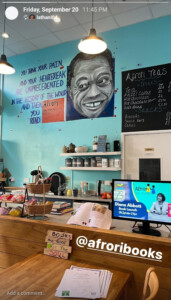
© Afrori Books
JR: Yes, it depends on the project. Reflecting over the years, we’ve seen different levels of engagement. For instance, our last project focused on archives and involved a drive towards universities, which attracted a lot of young participants. Out of 55 volunteers, 35 were much younger than usual. So it’s clear that level of interest and the demographics can vary significantly depending on the focus of the project. The Brighton Transformed project,telling the stories of Trans people living in Brighton & Hove, which we did ten years ago, recently had a 10th anniversary event that mainly attracted younger people, particularly those interested in the history of Trans lives.
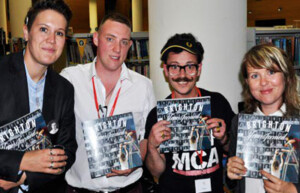
Participants in Brighton Transformed at the launch event, 2014.
MD: Obviously, we’re living in a time of deep austerity and recession. What are the main challenges for a bookseller or book creator in the marketplace at the moment?
JR: There are fewer and fewer outlets now for selling books . Bookshops like Borders and Sussex Stationers have closed, and even Waterstones has become less accommodating to our products. Fewer outlets, combined with the squeeze on disposable incomes, presents significant challenges. But at recent events, we’ve sold as many books than before, if not more.
CB: Oh yes, the lack of bookshops is a challenge. But also the industry still feels so archaic in so many ways. It is really difficult to make a living and it seems that the big five traders are the only ones making the money. High rents are crippling many of my friends in the industry. And the supermarkets underselling mainstream booksellers is making it hard to win customers. A school recently asked me for 350 books at a price that was lower than my buying price, because a warehouse had quoted that price. It is impossible to compete when publishers offer massive discounts to some outlets but not others.
As a specialist shop it takes a little longer for recession and financial crisis to hit us. I’m heartened that our customers have already made the decision to spend a little more as an expression of activism.
MD: So coming from a grassroots community perspective, what are the challenges then of navigating 21st century capitalism, technology, Amazon, PayPal, all of that
and the contradictions inherent within that?
CB: We don’t deal with Amazon in any way. Not with an organisation that is crushing our industry, ripping off authors and creatives, having a detrimental effect on the planet, denying workers their rights and so much more. There are so many alternatives. Just look at Bookshop.org, Libro, FM, KOBO. My customers would be very confused if we aligned ourselves with Amazon and it would not be okay for me personally. It is important that we maintain our independence and that we use our voice as we see fit. We won’t allow ourselves to be silenced. This has been the case for black people for centuries and is what we are trying to change.
JR: QueensPark is a charitable organisation so we can’t have explicitly political objectives, but there is and has always been an inherently political aspect to our work, especially in promoting community activism and voices. This can sometimes conflict with platforms like Amazon. However, Amazon as a global bookstore is a valuable platform for selling books and gaining visibility. Working with them is challenging both politically and practically, but I believe we should because any income is useful to us. Similarly, Kindle has become the dominant e-book platform, so we’ve made our books available there. While the sales aren’t substantial yet, I hope they will increase as we promote them more.
Oh! Politically it sticks in my craw but balancing local bookshops, our website, and larger platforms is part of the mix to maximise our reach and sales. I wish we could find a way around it and I don’t know what that is yet. Maybe someone reading this right now has the answer! Fifty years of QueenSpark has shown me just how smart and creative the people of this city can be, so I wouldn’t be surprised!
This interview was informed and inspired by the Business of Women’s Words project. This research project explores the history of feminist publishing and book trading during women’s movements of the 1970s-90s, and their legacies for social justice-led creative industries today. The ‘BOWW’ project is led by Professor Margaretta Jolly at the University of Sussex and you can find out about its many activities and ideas here. This includes a free downloadable Guide to Archives and Resources, celebrating the rich and diverse heritage of businesses like QueenSpark and Afrori where profit is committed to the interests of purpose and people.

